Blog (446 found)
NLD-led Government has Legitimacy but Lacks Power to Pursue Reforms?
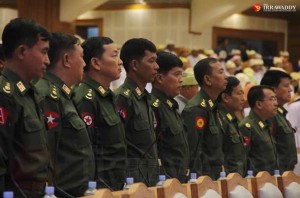 Last week in the newly-constituted and reinvigorated Parliament, National League for Democracy (NLD) lawmaker Khin San Hlaing tabled an emergency motion requesting an inquiry into the questionable nature and circumstances of business deals involving the sale of national assets and resources by the outgoing Government allegedly without proper safeguards or due process […]
Last week in the newly-constituted and reinvigorated Parliament, National League for Democracy (NLD) lawmaker Khin San Hlaing tabled an emergency motion requesting an inquiry into the questionable nature and circumstances of business deals involving the sale of national assets and resources by the outgoing Government allegedly without proper safeguards or due process […]
More Arrests on Trumped Up Charges as Outgoing Government’s Term Approaches End
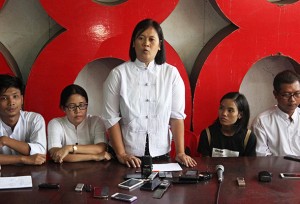 As Burma prepares for the upcoming annual cross-examination by the UN Human Rights Council on 14 March, 2016, 121 civil society organizations wrote to member and observer states requesting them to maintain the country under Agenda Item 4 (“Human rights situations that require the Council’s attention”) and urged the extension of the Special Rapporteur mandate at this critical juncture in the country […]
As Burma prepares for the upcoming annual cross-examination by the UN Human Rights Council on 14 March, 2016, 121 civil society organizations wrote to member and observer states requesting them to maintain the country under Agenda Item 4 (“Human rights situations that require the Council’s attention”) and urged the extension of the Special Rapporteur mandate at this critical juncture in the country […]
Divide Rule Produces Dividends for the Burma Army
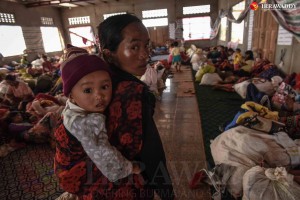 The decades-long tactic of divide-and-rule used by successive regimes in Burma when dealing with ethnic groups produced dividends in February 2016, as ongoing armed clashes between troops from the ethnic Ta’ang, Ta’ang National Liberation Army (TNLA) and ethnic Shan, Shan State Army – South (SSA-S), in northern Shan State has displaced up to 5,000 civilians in just one week while thousands more have been trapped in Kyaukme Township, waiting to move to a safe location […]
The decades-long tactic of divide-and-rule used by successive regimes in Burma when dealing with ethnic groups produced dividends in February 2016, as ongoing armed clashes between troops from the ethnic Ta’ang, Ta’ang National Liberation Army (TNLA) and ethnic Shan, Shan State Army – South (SSA-S), in northern Shan State has displaced up to 5,000 civilians in just one week while thousands more have been trapped in Kyaukme Township, waiting to move to a safe location […]
Burma’s Peace Process Needs a Fresh Start
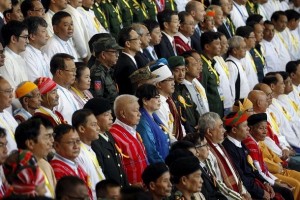
On Union Day, 69 years since the signing of the Panglong Agreement, it is time for a reappraisal and a new start to what has ultimately been an unsuccessful peace process […]
• • •New Lease of Life in Burma Parliament but Political Prisoners Left Behind
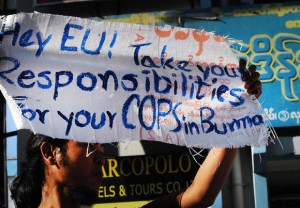 Optimism swept over Burma this past week as hopes for historic changes to the country heightened with the start of the new Parliament dominated by the National League for Democracy (NLD) […]
Optimism swept over Burma this past week as hopes for historic changes to the country heightened with the start of the new Parliament dominated by the National League for Democracy (NLD) […]
NLD’s Trip into the Murky World of the Drugs Trade
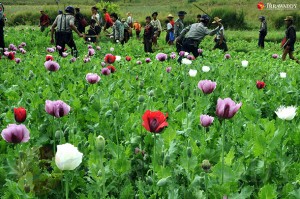 As the new Parliament sits for the first time in Naypyidaw, the National League for Democracy’s (NLD) choice of Union Solidarity and Development Party (USDP) member, T Khun Myat, as deputy lower house speaker demonstrates the intricate and complex web that links the USDP, the Burma Army, the drugs trade, and paramilitary drug militias as well as the dangerous ground the NLD treads in attempting to form a government of national reconciliation […]
As the new Parliament sits for the first time in Naypyidaw, the National League for Democracy’s (NLD) choice of Union Solidarity and Development Party (USDP) member, T Khun Myat, as deputy lower house speaker demonstrates the intricate and complex web that links the USDP, the Burma Army, the drugs trade, and paramilitary drug militias as well as the dangerous ground the NLD treads in attempting to form a government of national reconciliation […]
NLD Face Major Challenges as Lack of Rule of Law Perpetuates Impunity
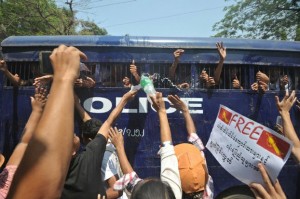 Just months before the end of the President Thein Sein Government, a series of events and issues publicized over the past week demonstrate the pressing need for reforms to establish rule of law in Burma […]
Just months before the end of the President Thein Sein Government, a series of events and issues publicized over the past week demonstrate the pressing need for reforms to establish rule of law in Burma […]
Time for a Fresh Start for Genuine Peace
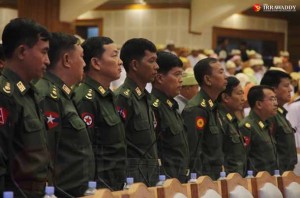 Between 12-16 January, 2015, the ‘Union Peace Conference’ was held with over 700 representatives of the Burma Government, signatories of the Nationwide Ceasefire Agreement (NCA), Members of Parliament, political parties and other invitees in Naypyidaw […]
Between 12-16 January, 2015, the ‘Union Peace Conference’ was held with over 700 representatives of the Burma Government, signatories of the Nationwide Ceasefire Agreement (NCA), Members of Parliament, political parties and other invitees in Naypyidaw […]
Burma Army Moves to Tighten Grip on Power
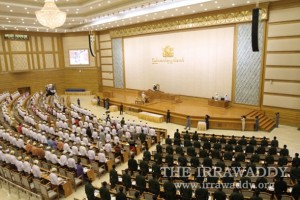 While people were still in a buoyant mood over the November 2015 elections results, wrapping up last year’s work and preparing for 2016, the Burma Army and the Government had a clearly different agenda, initiating several discreet moves in an attempt to maintain its grip on power during the term of the future National League for Democracy (NLD) Government […]
While people were still in a buoyant mood over the November 2015 elections results, wrapping up last year’s work and preparing for 2016, the Burma Army and the Government had a clearly different agenda, initiating several discreet moves in an attempt to maintain its grip on power during the term of the future National League for Democracy (NLD) Government […]
Burma Embarks on a New Chapter as Hope and Suffering Define 2015
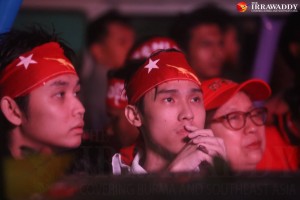 The highlight of 2015 was undoubtedly the historic general elections, which saw Daw Aung San Suu Kyi’s National League for Democracy (NLD) party triumph emphatically at the polls on 8 November 2015. While the conduct of the polls was relatively smooth, the elections were marred by glaring irregularities, in particular during the preparation and campaign stages. They ranged from the partiality of the Union Election Commission (UEC), disqualification of minority candidates, rife voter disenfranchisement of large segments of minority communities due to conflict and blatantly discriminatory policies, and voter lists fraught with discrepancies.
The highlight of 2015 was undoubtedly the historic general elections, which saw Daw Aung San Suu Kyi’s National League for Democracy (NLD) party triumph emphatically at the polls on 8 November 2015. While the conduct of the polls was relatively smooth, the elections were marred by glaring irregularities, in particular during the preparation and campaign stages. They ranged from the partiality of the Union Election Commission (UEC), disqualification of minority candidates, rife voter disenfranchisement of large segments of minority communities due to conflict and blatantly discriminatory policies, and voter lists fraught with discrepancies.
However, the first competitive national vote since 1990 was significant as it marked a key milestone in Burma’s democratic transition process and more importantly, it resoundingly signaled the will of the people for “genuine change” […]
• • •








 All posts
All posts